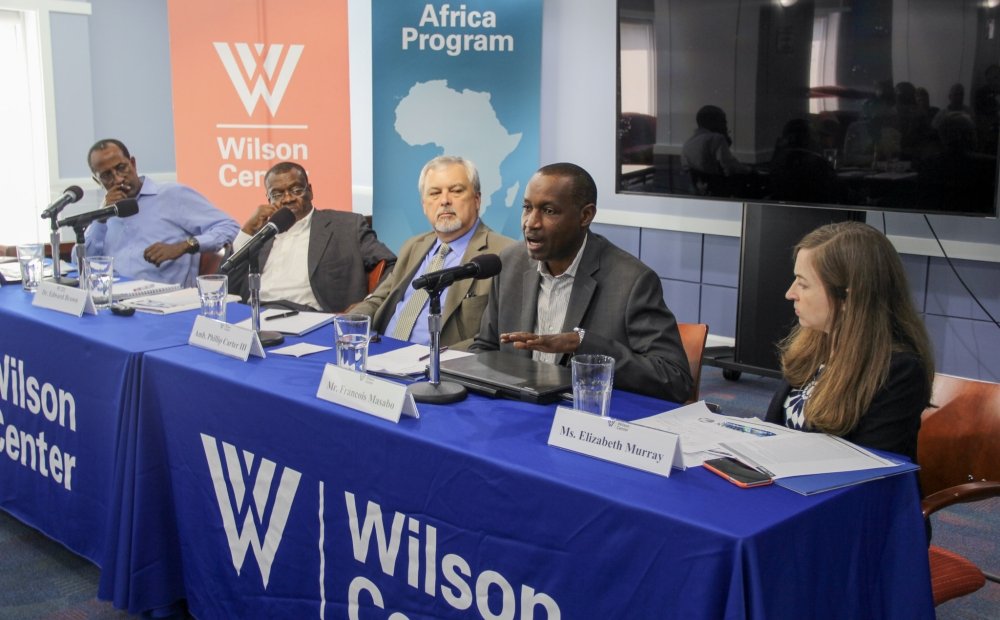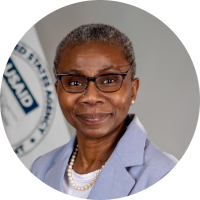Post-Conflict Peacebuilding - Key Issues, Challenges, Lessons Learned, and Best Practices

On July 12, 2017, the Wilson Center Africa Program hosted a panel discussion on “Post-Conflict Peacebuilding – Key Issues, Challenges, Lessons Learned, and Best Practices,” as part of the 2017 annual Southern Voices Network for Peacebuilding conference. The event featured five speakers, Dr. Kidane Kiros Bitsue, the Director, Institute for Peace and Security Studies (IPSS);
Dr. Edward Brown, Director, Policy Advisory Service, African Center for Economic Transformation (ACET); Ambassador (Ret.) Phillip Carter III, Executive Vice President, Jefferson Waterman International, and former U.S. Ambassador to the Republic of Cote d’Ivoire and Guinea; Professor Francois Masabo, Acting Director, Center for Conflict Management (CCM), National University of Rwanda; and Ms. Elizabeth Murray, Senior Program Officer, Middle East & Africa, United States Institute of Peace (USIP). Together, the panelists examined post-conflict peacebuilding from several angles, including the successes and challenges of the African Union’s framework, the economic development dimensions of peacebuilding, international engagement in interventions, the use of indigenous approaches and mechanisms, and the role of national dialogues.
Dr. Kidane Kiros Bitsue discussed the African Union’s (AU) post-conflict peacebuilding and reconstruction framework, including its contents, rationale, and challenges of implementation. According to Dr. Bitsue, post-conflict peacebuilding is a priority area for the AU and a key component of Agenda 2063, which reflects the desire for peace and stability across the continent. The AU peacebuilding policy, which Dr. Bitsue applauds as comprehensive and inclusive, was established to combat issues of identity, national security, and relapses of violence. While the policy includes measures to address security, political governance, human rights and justice, and women and gender, the measures have not yet been adequately implemented. To remedy the gap in implementation, Dr. Bitsue recommends structural change at both the AU and the regional economic community levels and an emphasis on capacity-building to ensure proper implementation of the policy in post-conflict peacebuilding efforts in Africa.
Dr. Edward Brown addressed the role of public financing and economic management in contributing to conflict resolution and domestic resource mobilization for development. Dr. Brown discussed how recent decreases in international aid and development funding are affecting state resource mobilization. Due to these declines, post-conflict countries may struggle to develop strong institutions and fund successful peacebuilding processes. He noted that African countries are increasingly accessing capital markets and borrowing. Dr. Brown argued that post-conflict states must increase tax-system literacy, expand potential tax yields, and close revenue loss gaps by addressing tax exemptions, political interference, revenue management, and failed tax collections in order to successfully generate domestic resources. Moreover, Dr. Brown suggested that new tax systems should include broad-based taxes to facilitate local revenue generation. While Dr. Brown notes that domestic resource mobilization is weak in many states, the issues can be solved through the commitment of leaders, support for capacity-building, and the development of more effective domestic tax systems in states undergoing post-conflict peacebuilding.
Ambassador (Ret.) Phillip Carter III discussed international engagement in post-conflict situations, acknowledging that many international interventions in Africa attempt to stop ongoing violence but fail to address the root causes of conflict. Often, interventions prepare for combat but neglect post-conflict planning—creating a gap in the post-conflict peacebuilding process. Ground-level coordination on this front is imperative for rebuilding the trust deficits that exist after a conflict. Ambassador Carter stated that repairing the trust deficit is the biggest challenge for post-conflict peacebuilding and requires buy-in from both international actors and local communities. He recommends that international actors learn what is happening on the ground, identify the local actors, and stress economic reconstruction of communities at the local level. Ambassador Carter’s presentation made a clear call for addressing the root causes of conflicts by going beyond national capitals and establishing inclusive healing strategies for post-conflict peacebuilding in Africa.
Professor Francois Masabo focused on indigenous approaches to post-conflict peacebuilding using lessons learned from Rwanda. Outlining the context of post-genocide Rwanda, Professor Masabo discussed the conflict’s total destruction of societal norms and offered examples of efforts to rebuild social cohesion within the country. One such example was that of a state-led program, “One Cow per Family,” to provide all households with a cow—which have intrinsic value in Rwanda and indicate a blessed household—to ensure that all citizens feel valued and included. Professor Masabo argued that peacebuilding programs must be state-centered in order to tackle both macro- and micro- level issues, and be holistic in nature, encompassing many issues simultaneously. Moreover, Professor Masabo recommended that post-conflict states have a fundamental, comprehensive, and people-centered framework in place to use as a guide before attempting to reconstruct after a conflict in order to address the challenges of building institutional capacity, stabilizing the country, and ensuring inclusivity in post-conflict peacebuilding.
Ms. Elizabeth Murray addressed the important role national dialogues can play in the peacebuilding process. According to Ms. Murray, the largest impediments to post-conflict peacebuilding are the lack of clarity about the resources needed to implement peace agreements, the lack of meaningful security sector reform, and the lack of inclusivity in implementation. Ms. Murray suggests that national dialogues can be used as a tool to combat these challenges as they provide the opportunity for traditionally marginalized groups to join the process. Inclusive participation in national dialogues increases pressure on governments to implement peace agreements and to establish concrete frameworks for country-wide ownership of the peacebuilding process. Ms. Murray offered recommendations for the international community, arguing that stakeholders must proceed with caution in facilitating national dialogues, take a critical look at the intentions of the elite in embarking on national dialogues, and empower traditionally excluded groups in order to be successful in post-conflict peacebuilding in Africa.
The Southern Voices Network for Peacebuilding (SVNP) is a continent-wide network of African policy and research organizations that works with the Africa Program to bring African analyses and perspectives to key issues in U.S.-Africa relations. Funded by the Carnegie Corporation of New York since 2011, the project provides avenues for African researchers to engage with, inform, and exchange perspectives with U.S. and international policymakers in order to develop the most appropriate, cohesive, and inclusive policy frameworks for the issues of peacebuilding and state-building in Africa.
Speakers
Moderator

Hosted By

Africa Program
The Africa Program works to address the most critical issues facing Africa and US-Africa relations, build mutually beneficial US-Africa relations, and enhance knowledge and understanding about Africa in the United States. The Program achieves its mission through in-depth research and analyses, public discussion, working groups, and briefings that bring together policymakers, practitioners, and subject matter experts to analyze and offer practical options for tackling key challenges in Africa and in US-Africa relations. Read more
